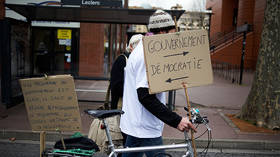Democracy in meltdown: In almost every country, people’s faith in democratic systems is at rock-bottom levels
29 Jan, 2020 15:30

A new study has delivered a huge reality shock to career politicians and liberal elites—that dissatisfaction with democracy has been rising for decades, and especially in the developed world is approaching an all-time global high.
World leaders love to toot the horn of democracy. To take just three recent examples, Angela Merkel, Justin Trudeau and even Barack Obama have all weighed in on how great their country’s democracies are. This would be all very well, if only the people agreed.
But according to research published this week by the Bennett Institute for Public Policy, a think tank based at the University of Cambridge, they do not. The findings were borne by asking citizens a simple question; whether they were satisfied or dissatisfied with democracy in their countries. Surveys conducted between 1973 and 2020 were analysed.
In total, the question was posed to over 4 million people. By combining all of these sources they were able to outline the changing perceptions of democracy over the past 25 years worldwide, and over the past 50 years in Western Europe.
ALSO ON RT.COMThe end of Russia’s ‘democratic illusions’ about America (By Stephen Cohen)Rot setting in
And the results were unequivocal. Wherever in the world you look, you will find democracy in a state of malaise.
Overall, since the mid-1990s, the number of people who say they are "dissatisfied" with democracy has increased by almost 10 percentage points from 47.9% to 57.5%. That figure is the highest in the time taken in by the study, and 2019 is the year with the highest level of democratic discontent on record.
In developing countries around half of people are dissatisfied with democracy in their countries—a huge figure, although this represents only a slight increase in the last 25 years. The authors believe that poorer countries received an injection of positivity from their brand new democracies, but as people see their countries slide back into crime and corruption it is beginning to wear off.
ALSO ON RT.COMParis descends into chaos as riot police deploy GRENADES & WATER CANNONS against striking firefighters (VIDEOS)
The decline is particularly severe in developed countries (defined in this study as Europe, North America, East Asia and Australasia). Here, the proportion of people dissatisfied with democracy in their country has increased from one-third to half over the last 25 years—an average increase of around 17 percentage points. Ironically, and unsurprisingly, faith in democracy peaked in 2005, right before the onset of the global economic recession. Pride comes before a fall?
There is one region where belief in democracy is going strong. The ‘’island of contentment’’ as the authors have dubbed it, includes Switzerland, Denmark, Norway, the Netherlands and Luxembourg. Here, less than one-quarter of people are dissatisfied with democracy. But less than 2% of the world’s democratic citizenry live in this oasis, and much of their satisfaction probably has to with being among the richest and most stable countries in the world.
A not-so-special relationship
Amid all this, how is the world’s greatest democracy doing? Not so well. In a single generation in America, over one-third of the population became dissatisfied with democracy there—an astonishing 34 percentage points. It remains to be seen how it turns out, but what would the impeachment of President Trump do to the perceptions of for democracy? Could it be the final blow to an already fragile political structure?
Across the water in the UK, Brexit has absolutely tanked faith in democracy. It had been going steadily ever since the 1970s, despite a few wobbles in the Blair era after the Iraq War and an MPs’ expenses scandal.
ALSO ON RT.COMFarewell Friday: EU won't miss the British MEPs who shamed their nation with their greed, corruption and brawlingWho’s fault is this anyway?
Lead author Dr Roberto Foa said that "The rise of populism may be less a cause and more a symptom of democratic malaise.’’ He also added "If confidence in democracy has been slipping, it is because democratic institutions have been seen failing to address some of the major crises of our era, from economic crashes to the threat of global warming. To restore democratic legitimacy, that must change."
Dr Foa is right—this is not a problem of perceptions; of a febrile public who have been bamboozled by fake news and fire-breathing demagogues. People think democracy is broken because it is. Were you to believe the mainstream media in the west, you would think that if it weren’t for these pesky populists like Trump, Orban and Boris Johnson, democracy would be going swimmingly. They are simultaneously the cause of and symptoms of the disease, and as soon as they are out of office everything will be back to business as usual.
ALSO ON RT.COMCatapulting Hong Kong into democracy? Media glorifies ANARCHY & ‘novel, defensive’ anti-police weapons of protesters
But what this study shows beyond doubt is that people everywhere, on every continent, are becoming more and more disillusioned with the system under which they live. They are told that by having an election every few years they can decide what kind of societies they want to live in, but increasingly, they see that this is not so. They sense that something is wrong—every election cycle they see the same pre-packaged candidates trotted out, having faux-heated debates with each other despite having substantially identical policies on the issues that matter most.
‘’Democracy’’, goes the adage, ‘’is two wolves and a sheep voting on what to have for dinner’’. Apparently, more and more people are beginning to see it that way. For the rest, it’s time to wake up and smell the mutton.

0 Comments:
Post a Comment
Subscribe to Post Comments [Atom]
<< Home